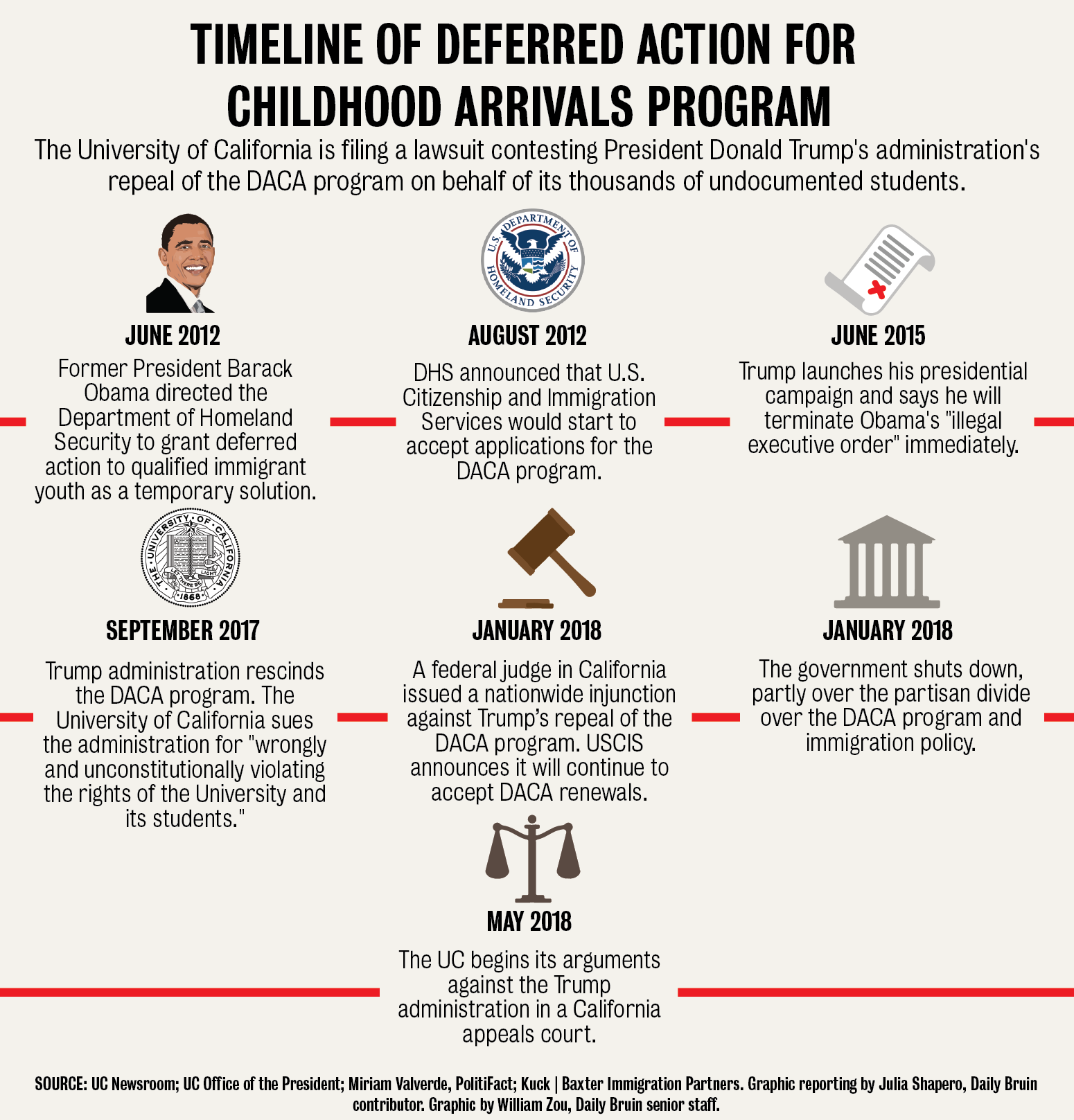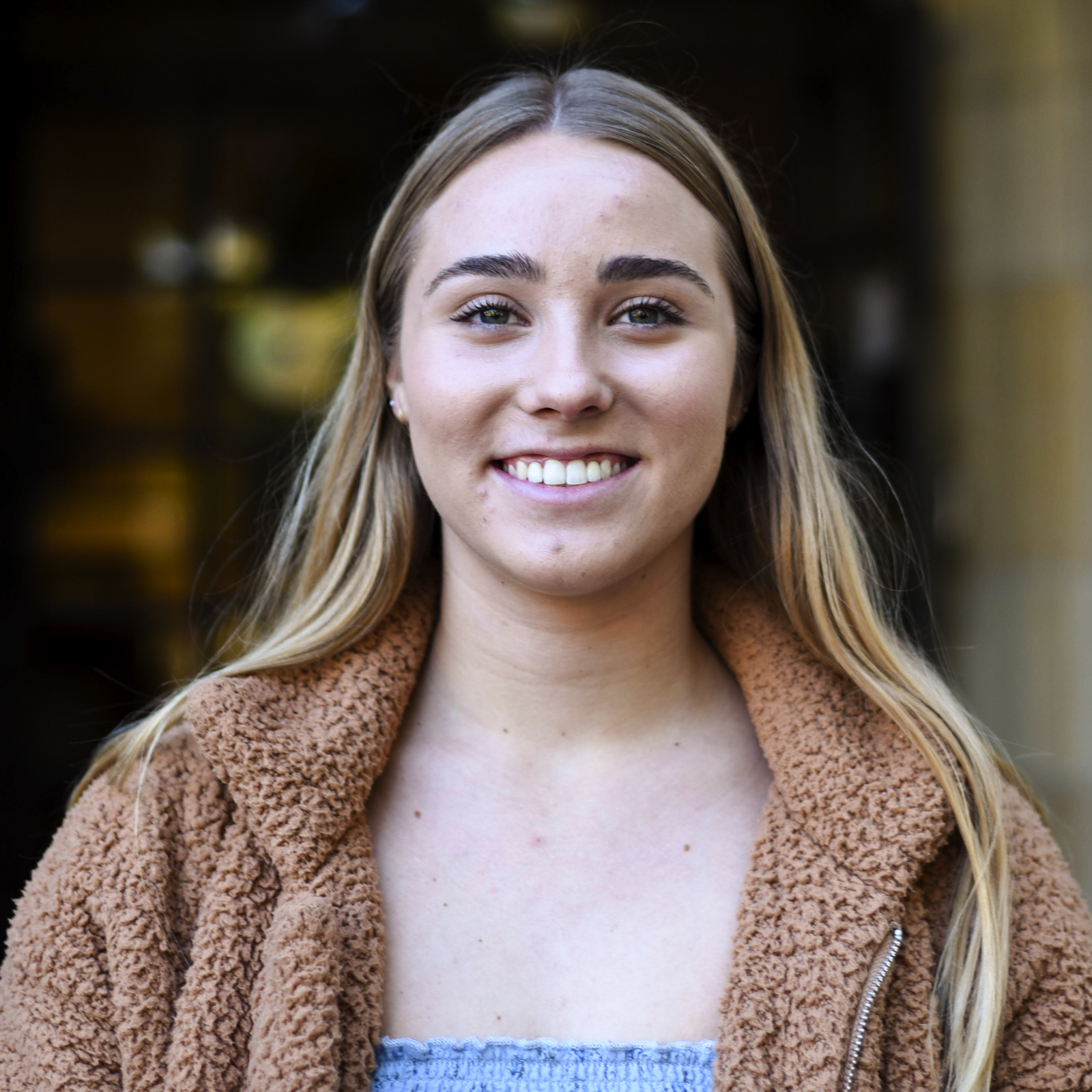UC community awaits ruling on lawsuit contesting termination of DACA


By Julia Shapero
June 10, 2018 1:18 a.m.
Eduardo Perez clearly remembers Sept. 5, the day President Donald Trump announced his decision to terminate the Deferred Action for Childhood Arrivals program.
But Perez, a first-year political science student and DACA recipient, also remembers the email UCLA, the school he was going to attend that fall, sent out in response.
“I remember receiving an email from UCLA saying that (University of California President) Janet Napolitano had been working on a lawsuit against this … and that UCLA was committed to creating a space where undocumented students felt welcome,” Perez said. “I really appreciated that and I hadn’t even started school yet.”
The decision of the lawsuit, along with the status of Perez and about 800,000 other undocumented students, now sits in the hands of the judges of the U.S. Court of Appeals.
The UC’s lawsuit contesting the Trump administration’s decision to end the DACA program was heard May 15 in the U.S. Court of Appeals for the 9th Circuit.
Now the UC and its DACA recipients await a decision.
The DACA program, which was created in 2012 under former President Barack Obama, protects the children of undocumented immigrants from deportation as a temporary fix to a larger issue, said Amjad Mahmood Khan, a lecturer at the UCLA School of Law.
“(The DACA program) doesn’t provide a path to citizenship,” Khan said. “But what it does is it allows them to continue to work, to continue to go to school, be meaningful participants in the labor workforce and live their lives not in the shadows until such time that Congress allows there to be a more permanent fix.”
Perez said he thinks it is a privilege to be able to benefit from the DACA program.
“There are other undocumented students here at UCLA that don’t have the same safety net that I do, the same privilege that I do, like having that work permit and that temporary relief for those two years that you have some sort of safety net,” Perez said.
The Trump administration announced its decision to rescind the program in September on the basis that it conflicted with current federal immigration law, said Khan.
The UC countered immediately with its lawsuit, claiming the repeal of the program did not give undocumented students the due process they deserved under the law, Khan added.
A January federal court ruling blocked the Trump administration’s decision to rescind the DACA program, granting a reprieve to recipients who expected the program to end in March 2018.
UC spokesperson Stephanie Beechem said three federal district judges have separately ruled against the repeal of the DACA program.
“We further argued that the district courts were correct in granting injunctive relief to prevent ‘catastrophic and irreparable harm to DACA recipients, their families, employers, schools and communities,’” Beechem said.
Beechem added that the UC was the first university system to file suit against the Trump administration for their decision to rescind the DACA program.
Perez said he chose to attend UCLA because it offered a variety of support mechanisms for undocumented students.
“When I was trying to decide what school to go to, UCLA really caught my attention because of (its Undocumented Student Program) and the Bruin Resource Center and because of the work that is done on this campus for undocumented students,” Perez said.
Upon arriving at UCLA, Perez noticed that students were the most active in the work done on campus to support undocumented students.
“I know of a lot of amazing students (who) are involved with (Improving Dreams, Equality, Access, and Success) and have been working toward educational awards for undocumented students that have been trying to alleviate the financial insecurity that a lot of undocumented students face while trying to afford college,” Perez said.
The wait for the decision raises the question of how far the UC’s case will go.
Khan said he believes the case will go to the Supreme Court and will focus on whether ending the program was within the Department of Homeland Security’s authority under federal immigration law.
He said he thinks it is difficult to say how the lawsuit will be decided, but predicted the ruling will be in favor of the UC. However, he emphasized that the DACA program is not a permanent solution to the status of undocumented students.
“I think that lawsuits like the one the UC Regents filed are critical for triage,” Khan said. “They’re critical to stop the bleeding on the harm that’s being suffered by the recipients, but there’s really only one true fix to the problem of the legal status of the Dreamers and that’s through an act of Congress.”
A discharge petition currently circulating that would allow the House of Representatives to vote on immigration legislation and create a permanent fix is a few signatures short of a full vote.
A discharge petition is a means to move a bill from committee to the House floor for consideration.
“I think even this week the discharge petition issue will be decided and if it (is passed) there could be a dramatic showdown in Congress on this bill that could give a permanent fix,” Khan said. “My sense is that Congress will fix this issue before the Supreme Court ever decides it.”
However, Perez said he thinks there is still work to be done regarding how the DACA recipients are viewed and portrayed in American society.
“A lot of times, students like myself are used as an example as why undocumented people should stay in the country,” Perez said. “But I think it’s important to recognize that immigrants and why they’re in this country shouldn’t be measured by their academic achievements or by their economic contribution to the country or what job they have or what degrees they hold.”

